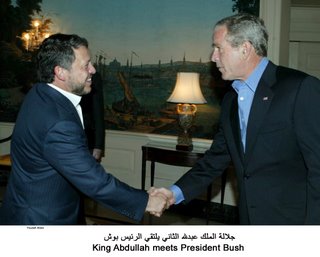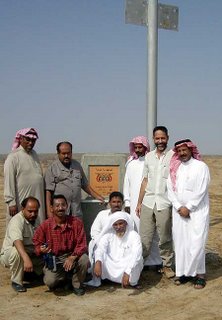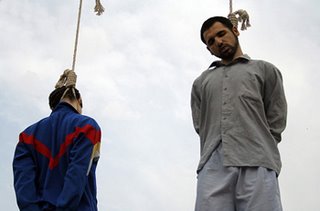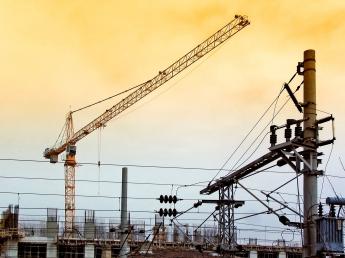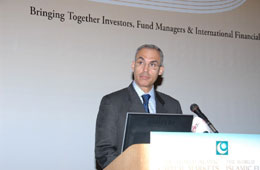
HE Rasheed Mohammed Al Maraj, Governor, Bahrain Monetary Agency welcomed 400 participants from more than 20 countries from around the globe to the second annual World Islamic Funds & Capital Markets Conference at a grand opening ceremony today at the Gulf International Convention Center in the Kingdom of Bahrain.
This conference is a unique platform to engage senior decision-makers in the global Islamic Fund Management and Investments Industry.
Recent studies indicate that Shari'ah-compliant assets, growing over the last 20 years, represent an estimated USD 300 billion banking assets & approximately USD 400 billion Capital Market activities. The estimated annual growth for Islamic Capital Markets ranges from 15% to 20%. Given this dynamic growth scenario, the theme of the conference 'Bringing Together Investors, Fund Managers & International Financial Institutions to Capture Growth Opportunities in Islamic Capital Markets' is geared towards realising opportunities in this sector.
Speakers from UK, USA, UAE, Kingdom of Bahrain, Pakistan, Malaysia, India, Kuwait and Kingdom of Saudi Arabia came together to identify new growth opportunities in the swiftly evolving Shari'ah-Compliant Funds Market and the rapidly increasing global Sukuk and Islamic Capital markets. WIFC & WICMC 2006 moderator William McSheehy of Bloomberg encouraged debate and facilitated discussions between the expert international panelists and audience.
Addressing the conference participants, HE Rasheed Mohammed Al Maraj, BMA Governor, said
'It is our constant endeavour to better the environment for Islamic funds and capital markets in the global investment market. Bahrain's advances in regulation of Islamic instruments have had a positive impact on this segment of the Islamic Financial industry that is on the rise and we are pleased to host this significant world conference in the Kingdom'.
Ijlal Alvi, Chief Executive Officer, International Islamic Financial Market led the discussions at the opening 'Regulatory & Business Open Forum' session that focussed on Effective Regulatory Frameworks for the Development of Islamic Capital Markets. He commented 'Islamic Capital Markets have the potential to reach several trillion USD. With the complexities of the Capital Market and the various instruments on offer or to be offered, clearly an international Islamic authoritative body is required to define and provide guidance on what is and is not permissible under Islamic Law'.
Islamic securities (Sukuk) are emerging as a significant class of asset for the Islamic Banking Industry. These were addressed at the next session 'Realising the Full Potential of the Global Sukuk Market' that focussed on overcoming obstacles to the growth of the sovereign and corporate Sukuk market, developing the secondary market for Sukuks: creating liquidity and exploring the potential for new international Sukuk issues. Speaking during the session, Ahmed Abbas, Chief Executive Officer, Liquidity Management Center, said 'As at the 1st Quarter of the year 2006, the size of the Sukuk market was approximately USD 14 Billion. Approximately USD 5 Billion issued by Sovereign entities and USD 9 Billion issued by corporate entities.'
The session also heard from Asad Zafar, Managing Director, Asset Finance and Advisory Group, HSBC Amanah and Fuad Al-Homoud, Head of Founder's Committee, Sokouk Exchange Center Co. (Tadawul).
In the following session 'Assessing Key Developments & Innovations in Islamic Funds' Abdul Rahman Mohammed Al-Baker, Executive Director-Financial Institutions Supervision, Bahrain Monetary Agency addressed the participants. Dhafer AlQahtani, General Manager- General Directorate of Specialised Funds, Al-Tawfeek Company for Investment Funds Ltd. spoke about Trends and Outlook for the Islamic Funds and discussed global trends and new developments.
The World Islamic Funds and Capital Markets Exhibition running alongside the conference was opened by the Deputy Governor of the Bahrain Monetary Agency, HE Anwar Khalifa Al Sadah and showcased leading Islamic financial institutions, conventional banks, consulting & advisory firms, IT solution providers and international media.
The sessions that followed included 'The Shari'ah Open Forum on Capital Markets & Investment Funds'; 'Global Perspectives on Islamic Funds'; and 'Exploring New Opportunities & Tackling Challenges in Islamic Capital Markets'.
On the sidelines of the conference a press conference and a closed door session on Capital Markets was held that was facilitated by Sokouk Exchange Center Co. (Tadawul).
At the end of the first day's proceedings, The World Islamic Funds Excellence Award and the World Islamic Capital Markets Excellence Award will be presented during the Awards Ceremony.
This will be followed by the Conference Luncheon hosted by the Bahrain Monetary Agency. The conference will feature several networking functions including the Gala Dinner themed Business Strategies for Global Markets that will be hosted by HSBC Amanah.
To explore Real Estate Funds, Venture Capital, Hedge Funds, Private Equity and Sector Funds, day two's proceedings will start with the session on 'Capturing Growth Opportunities in Key Islamic Fund Sectors'. The session will be delivered by Richard Thomas, Head of Islamic Financial Services, Islamic Asset Management and alburaq, ABCIB Islamic Asset Management Ltd; Mustafa E. Al - Saleh, Managing Director, Adeem Investment Company; Stella Cox, Managing Director, Dawnay, Day Global Investment Limited; Hany Shawky, Senior Investment Manager-Strategic Investment Group, Global Investment House and Mohamed Shaikh, Assistant General Manager, Head of Product Structuring, Al-Tawfeek Company for Investment Funds Limited.
The other sessions will include 'Institutional Investors & End-Users RoundTable'; 'Assessing Key Trends in Capital Markets' and 'International Perspectives on the Development of Islamic Capital Markets'.
The conference will conclude with 'The Investment Funds & Capital Markets PowerTable 2006' tomorrow. This is an interactive round table discussion group that will be led by Ernst and Young.
Speakers and panelists from McKinsey & Company, Islamic Development Bank (IDB), Al Tamimi & Company Advocates & Legal Consultants, King Abdulaziz University, Unicorn Investment Bank, Calyx Financial, Islamic International Rating Agency, Shari'ah Capital/ Meyer Fund Management, Calyon Corporate & Investment Bank, Norton Rose, Maybank Investment Banking Group, ABC Islamic Bank, Infrasoft Technologies, EFG-Hermes and Meezan Bank will also address conference participants on 7 & 8 May 2006.
The Strategic Partners & Associates of the conference include Bahrain Monetary Agency who are supporting the event, Strategic Partner McKinsey and Company; Platinum Strategic Partners Al Baraka Banking Group, Al Tawfeek Company for Investment Funds, Al Amin Bank and Al Baraka Islamic Bank; Gold Strategic Partners ABC Islamic Bank, ABCIB Islamic Asset Management, Adeem Investment Company and Infrasoft Tech; Sukuk Partner Sokouk Exchange Center Co. (Tadawul); Gala Dinner Host HSBC Amanah; Silver Strategic Partners & Awards Associate Ernst & Young; Silver Strategic Partner KPMG; Associate Sponsor Calyx Financial; Strategic Associate Al Tamimi & Company, Advocates & Legal Consultants; Development Associate International Islamic Financial Market; Technology Partner Path Solutions; Bronze Partner Zawya; Day 2 Conference Luncheon Host Financial Technologies; Lanyard Sponsor Shamil Bank; and Associate Supporters Bahrain Economic Development Board and General Council of Islamic Banks and Financial Institutions (CIBAFI).
Bahrain Financial Harbour, National Investments Company and Ohad Trusts are exhibiting along with the other partners and associates of the conference. (AME)
